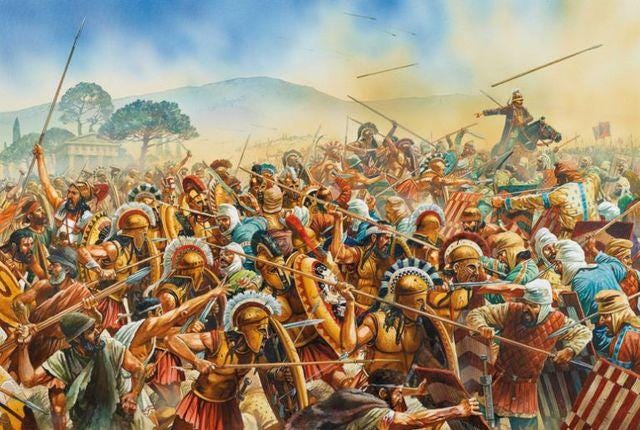On May 28th, 585 BC, a miracle took place.
As the two great armies of the Medes and the Lydians1 clashed in the battlefield near the Halys river on a scorching afternoon, the sky above them suddenly turned black as night.
In a matter of seconds, soldiers went from sweating under the ruthless Turkish sun to feeling an eerie coolness build up in the air.
The metal clash of swords and spears came to a halt; the screams of anger and agony slowly quieted down. The dust settled.
Suddenly, every man on the field found himself looking up with trembling knees as he watched the sun become engulfed by a giant shadow.
Overwhelmed by what they just witnessed (and fearing it could be a sign of the gods) the generals of both armies immediately signed a peace agreement and ended the ongoing conflict.
And, to be honest… can you blame them?
Most people back then had no idea what a solar eclipse was.
It’s not every day that an entire war is interrupted by the moon casually getting in front of the sun, so it’s understandable that the armies decided to call it a day and go home to their wives… you know—just in case.
Events like these are practically unprecedented. The war between the Medes and the Lydians had been on for over 6 years—and everything pointed to it lasting many more.
Nobody could have ever predicted that something as daunting and exceptional as an eclipse would put such a sudden end to it…
… or could they?
On that very same day, a man living in the nearby city of Miletus was not frightened by the event whatsoever. In fact, he probably had a proud grin on his face.
That man was Thales of Miletus, the sage who, according to Herodotus…
… had foretold this loss of daylight to the Ionians, fixing it within the year in which the change did indeed happen.
So, not only did Thales know exactly what a solar eclipse was, he also knew exactly the year it would take place in.2
Thales’ “forecasts” also made him rich. He famously used his knowledge of meteorology to predict a great olive harvest, and then bought a bunch of olive presses in advance, at a low price. When the time came, he rented them out to the highest bidder at a pretty premium—and made himself a fortune.3
Yet, no matter how impressive his predictions, I don't think Thales could have ever guessed that history would remember him as the first philosopher and scientist of all time, nor that the date of the eclipse would (generally) be used to denote the very birth of those disciplines themselves.
That's right:
If you had ever wondered when science and/or philosophy began, now you know—with pedantic precision—that they first came to light on the dark afternoon of May 28th, 585 BC.
Upwards,
Yago
Somewhat equivalent to Iranian and Turks today.
There is no direct evidence for it, but historians agree that Thales had probably learned about cosmology from the Babylonians.
Some historians speculate this is the very first instance of option trading in history.


